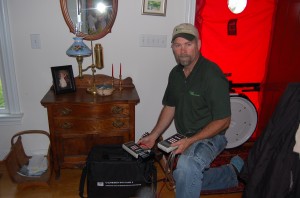 Addressing our lighting issues was rewarding but since lighting is a small portion of what we spend, it would be more rewarding to hit one of the larger energy hogs. If we add the space heating to the space cooling figure we find that 43% of our energy bill goes to our HVAC system. Using our example again, that comes to $29.32 per month or $351.91 per year just for heating and cooling. Changes that would reduce this amount could lead to some real savings. Since we are paying over $29 per month to heat and cool the air in our house, the best thing to do is make sure that the heated and cooled air stays inside the house instead of leaking to the outside.
Addressing our lighting issues was rewarding but since lighting is a small portion of what we spend, it would be more rewarding to hit one of the larger energy hogs. If we add the space heating to the space cooling figure we find that 43% of our energy bill goes to our HVAC system. Using our example again, that comes to $29.32 per month or $351.91 per year just for heating and cooling. Changes that would reduce this amount could lead to some real savings. Since we are paying over $29 per month to heat and cool the air in our house, the best thing to do is make sure that the heated and cooled air stays inside the house instead of leaking to the outside.
Houses are generally very leaky, I’m speaking from experience, I’ve tested many. When you condition your air, some of it leaks out through small holes in your building envelope like leaks in your ductwork or plumbing penetrations. A general rule is that if you total all the leaks in your walls, ceiling and floors combined with ductwork and plumbing penetrations, you are talking about roughly 59% of your conditioned air leaks from one of these locations according to Dominion. Since we are paying $29 per month to heat and cool our homes, we certainly don’t want such a large portion of our conditioned air sneaking out through holes in our building envelope. These leaks could total as much as $17 of our heating and cooling dollars leaving the house through small holes. The secret to stopping the leaks is having an Energy Audit so that you can see where all the leaks are and have them sealed up. This will also make you feel much more comfortable in your home minus all the drafts.
An Energy Audit takes as little as 2 hours of your time and reveals a plethora of valuable information on how to tighten things up in your home. Remember, houses don’t need to breathe, people do and you don’t want to be breathing unfiltered air coming from your crawl space or attic. The Energy Auditors motto is “Build tight, ventilate right.” An Energy Auditor knows how to calculate how much fresh air you need in your house to support the number of people living there and he isn’t going to let you tighten things up to the point where your house would become unhealthy.
Air sealing a house can be as simple as applying caulk and spray foam insulation to the small holes in your building envelope that are discovered during the audit. You don’t need to run caulk around every window and door in your house that might not be where your leaks are. Rather than guessing, get the audit and know precisely where your house needs a little snugging up.
Check back again to read about the incredibly sexing world of insulation. Trust me, you will be amazed. Need an audit? Drop me an email e.guinn@DanGuinnHomes.com
